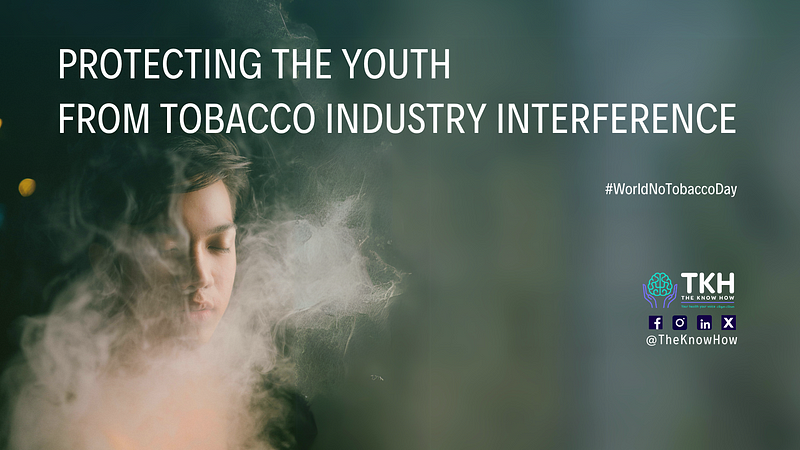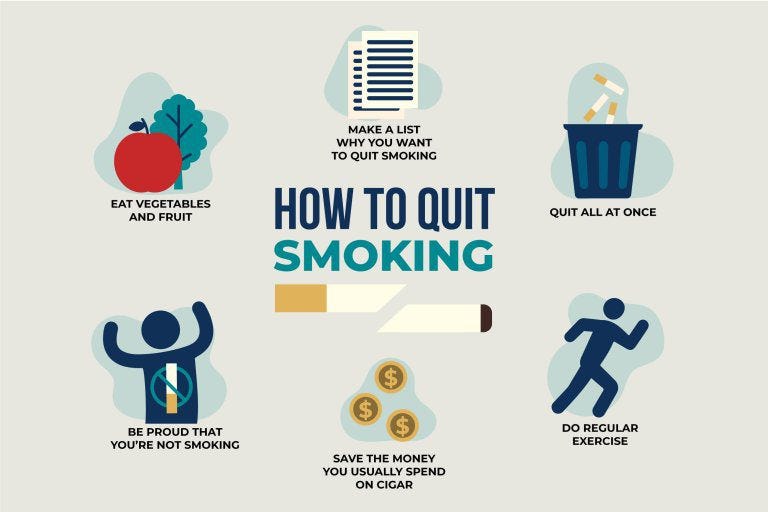

The theme of World No Tobacco Day 2024 is protecting young people from tobacco industry interference.
@TheKnowHow
Protecting the youth from tobacco industry interference
The World Health Organisation informs the public on the dangers of using tobacco, the business practices of tobacco companies, what WHO is doing to fight the tobacco epidemic, and what people around the world can do to claim their right to health and healthy living and to protect future generations.

Smoking is cutting life short in a multitude of ways.
Tobacco use is a major risk factor for cardiovascular and respiratory diseases, over 20 different types of cancer, and many other debilitating health conditions including diabetes, arteriosclerosis, and amputation. Every year, more than 8 million people die from tobacco use.
Tobacco can also be deadly for non-smokers: Second-hand smoke is the exposition to exhaled smoke of a smoking person to you as a non-smoker. Inhaling second-hand smoke has adverse health outcomes, causing 1.2 million deaths annually. Nearly half of all children in our global world breathe air polluted by tobacco smoke and 65 000 children die each year due to illnesses related to second-hand smoke.

Smoking: Not only a bad habit but addiction!
Nicotine contained in tobacco is highly addictive. Nicotine is a chemical that makes your brain produce feelings of pleasure, but the effects don’t last very long. When the pleasing effects wear off, you feel the need to smoke again to trigger the feelings of pleasure again. The more you smoke, the more nicotine you need to feel good which is how an addiction to nicotine can happen.
Flavorings in tobacco products can make them more appealing to youth. Start smoking as kid or as teenager imposes even more damage to the still developing organs and is more likely to induce a severe addictive misuse of this drug.
In addition, smoking is used as a social interaction. You might feel isolated as a non-smoker when your colleagues or your group of friends gather for smoking. Tobacco industry advertises smoking as an adventure or an expression of feeling free.

Quit smoking — Save your health!
When you need to smoke daily, you are probably addicted to nicotine. It can take time to break away from nicotine addiction. But when you have decided to quit smoking, it is possible! You will feel benefits in your health in short time, like improved taste of food, of breathing and general fitness and a better appearance of skin and teeth. In addition, you directly protect of your family and friends from the harmful effects of secondhand smoke.
Some smokers can quit smoking on their own, with help of friends or family. A promising strategy is:
- Set a fixed “quit date” and tell everyone about it.
- Get rid of ashtrays, lighters, and all smoking products and stop completely.
- Take one day at a time. Mark off each successful day on a calendar and be proud of it.
- Withdrawal symptoms tend to peak after 12–24 hours, but gradually ease then day by day.
- Try to avoid situations in which you are most likely to want to smoke for the first few weeks.
- Be prepared for an increase appetite and have sugar-free gum and fruits at hand.
- Do not despair if you fail, just start again. More than one attempt is usual.

If you feel you need more support to quit, get motivation and professional help! There are governmental smoking cessation programs which help you to quit, like the “Tobacco and Electronic Smoking Control Program” at the Abu Dhabi Public Health Center. We have put together some additional governmental programs for you:
- Discover the health benefits of quitting at ADPHC
- Checkout smoking cessation centers in
- Abu Dhabi at ADPHC
- Dubai and other Emirates at Emirates Health Service
- Saudi Arabia at Ministry of Health Anti-Smoking Clinics
- Qatar at Primary Health Care Corporation
- or at your local governmental health service.

Shisha, Dokha and Medwak — is this safe smoking?
No. It isn’t.
Smoking tobacco through a water pipe, also referred to as Shisha, is prevalent in Middle Eastern countries but has gained popularity worldwide, especially among youth. The increasing global trend of shisha use is mainly led by misleading information about it being safe. A session of shisha smoking for 40 minutes is equivalent to smoking 100 or more cigarettes. According to Jazan University in Saudi Arabia, most of the smoke from tobacco but also from the coal
products is made up of nicotine, carbon monoxide, tobacco-specific nitrosamines, polyaromatic hydrocarbons, volatile aldehydes, and traces of heavy metals like arsenic and chromium lead. Whether or not Shisha contains nicotine, its smoke has over 4800 different chemicals, 69 of which are known to induce or promote human cancer.
Toxins from tobacco-based shisha puts smokers at risk of developing:
- Human Cancer: Shisha smoking is a risk factor for lung, oral, esophageal, stomach, bladder, colorectal, and nasopharyngeal cancer.
- Respiratory effects: Shisha smoking is associated with chronic obstructive pulmonary disorder (COPD), bronchitis, and nasal congestion.
- Cardiovascular disease and metabolic syndrome: Shisha smokers have an association with hypertriglyceridemia, hyperglycemia, hypertension, and abnormal obesity indicating an association with metabolic syndrome.
- Effect on pregnancy and infertility: Smoking shisha and being exposed to second-hand smoke during pregnancy is associated with low-birth-weight babies and increased pulmonary problems for the new-born. Semen analysis studies confirm male infertility associated with shisha smoking.
One variation is a class of products marketed as “tobacco-free” alternatives for the “health-conscious user”. However, study findings of the American University of Beirut contradict advertising messages that “herbal” waterpipe products are a healthy alternative to tobacco products. Even if you use tobacco-free shisha, the smoke still produces harmful levels of toxins which can be either just as bad for you or even more harmful than smoke from tobacco-based shisha and cigarettes.

Congratulations, if you have decided to quit smoking!
Thank you, if you want to protect yourself, friends, family members or especially your kids from exposure to smoke pollution.
Let us stand together towards a smoking — free life.
Stay informed with us! Follow us on Medium, visit our Blog on https://theknowhow.ae/blog/

Comments
Post a Comment